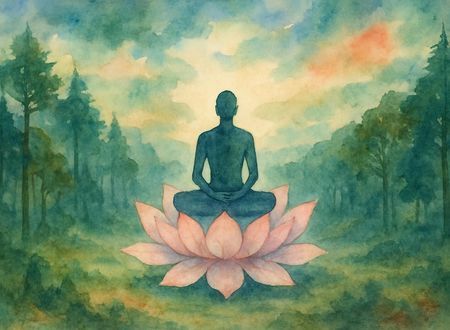
It is the path of selfless action. It is the practice of dedicating one’s actions to God and acting in a way that brings happiness to others.
It is a practical approach to life that allows you to live with purpose and meaning.
If you are trying to understand the basic principles of karma yoga, perhaps you need a more precise answer to what is karma?
Yogic Philosophy
In its most traditional sense, yoga was never about asanas or poses. It is a Sanskrit word that translates to ‘union’ in English. The essence of yoga is founded in the union of the mind, body, and soul, which indicates the union of the self with the divine. It’s the philosophy of oneness – of each individual being a part of universal consciousness.
There are four primary paths of yoga: Raja, Bhakti, Jnana, and Karma. Raja yoga involves mind and body control as it focuses on energetics and meditation. It is from this path of yoga that hatha yoga and modern asana practices developed. Bhakti yoga refers to the path of devotion and encourages you to devote yourself to worshipping the divine. Jnana yoga is the yoga of wisdom that urges you to study ancient scriptures like the Upanishads. Karma yoga is the yoga of action. It is about purifying your heart by training to act selflessly in the service of others.
The benefits of karma yoga:
- We learn compassion and kindness without expecting gains.
- We can step away from our ego and free ourselves from moving one step further on the path to enlightenment.
- Service can be a powerful tool to release our ego and learn to act with pure intentions to connect with the bigger picture.
Karma Yoga – A Practice in Daily Life
There are several ways to embrace philosophy in your life. Whether it’s traveling abroad to engage in service or giving your neighbor a helping hand, the opportunities are endless. Whatever you choose, incorporating service into your regular life is key to practicing this form of yoga. We suggest you make a weekly commitment to engage with a local charity by offering your time and effort to support their work. You can start with just that!
When practicing this philosophy, the sense of service must stem from a selfless place. It is about giving to those in need, spreading light, and sharing love. There are some ways to encourage this mindset; for example, you can practice chanting a mental mantra – anything that reminds you what the purpose of your service is and helps you stay grounded outside the ego.
Another helpful practice is to familiarize yourself with the people you are serving. Rather than thinking of service as an abstract concept, get to the ground and interact with those you serve. Allow yourself to be humbled by their experience and knowledge. Establish meaningful connections and let yourself be touched by their stories and lives.
Importance of karma yoga in business ethics
Business ethics deals with how we treat each other as human beings and how we treat our employees, clients, partners, and others who come in contact with our business or organization.
Businesses should always follow ethical practices to win customers’ trust and remain profitable in the long run, as well as help build a better society where everyone lives happily without discrimination or ill-treatment from others based on their race or religion, sex, etc.
As a business owner, you can practice the philosophy to guide your actions daily and make your business more ethical.
Karma yoga teaches us that even if we don’t use our wealth for ourselves, it will come back to us somehow. Many people who practice the philosophy believe that their good deeds will help them achieve their life’s purpose or dharma.
The best way to apply the philosophy in business ethics is to ensure you’re looking out for yourself and others. For example, if you see an opportunity to give back or help someone else succeed in the industry, take it! It may not be easy at first — especially if you’re still trying to build your empire — but it’s worth seeing how much good can come from doing something nice for someone else.
Simple Steps to Start With
Action is to move with intelligence. The world is filled with movement at all times. What it needs is more conscious movement or action.
Traditionally, a yogi was known for renouncing the world and living in a community setting like a monastery or an ashram. They would dedicate their lives to yoga, spirituality, meditation, and the service of others. By no measure were yogis socialites. This is possibly the most striking difference between the mystics of the past and the newly emerging urban mystics of our times.
We are experiencing full-fledged social lives with families and jobs, and we don’t necessarily need to renounce these factors to make any difference. We can make a difference by practicing the philosophy that translates to performing the right actions with the right attitude.
For some, karma yoga means sharing your gifts with those in need. It doesn’t imply giving away those gifts for free. It means that if you come across somebody genuine who could benefit from your knowledge, you should find it in yourself to share it with them. That is how a person supports a mission and fosters a community.
It could be as simple as teaching yoga to the vulnerable populations of our society or teaching English to a non-English speaking immigrant. In both situations, we are performing the ‘right’ action to raise the world’s morale.

Most yogis aim to connect with the individual consciousness, and that is where their journey ends. But true yoga unifies the individual consciousness with the universal consciousness. The practice of yoga is meant to teach us ways to expand our consciousness to feel like a part of the whole. Narrow consciousness translates to narrow awareness. Once a yogi starts to see this, they attempt to live in tune with nature and harmony with the universe. With this mindset, you would find your worries too small and insignificant, and all life forms would appear valuable.
Here are a few simple ways to practice karma yoga daily:
1. Start with self-service
If you wish to change the world, start at home – with yourself. Wake up to the everyday actions of your life that affect everything you do mindfully – from household chores like washing utensils to more important duties like your job. When you live your life from a place of awareness, you carve a path to nourish the universe that nourishes you. It is not selfish to be kind to ourselves or care for ourselves. If we are not healthy or peaceful, we cannot be expected to help others.
2. Be genuine
Take your authentic self anywhere you go. It’s easier said than done, but you must do what you must. In the current world, we are afraid to live our true nature for fear of being ridiculed or taken advantage of. But when we live our true nature without faking what society demands, we raise the bar for the collective, universal consciousness. The more people become genuine in their relationships, the more kindness will be shared, and fewer hearts will be broken.
3. Respect nature
People these days take nature and its resources for granted, often to the point of exploitation. If you had to grow up in a developing country with limited access to clean water, you would naturally be more cautious of the number of resources you utilize daily. Next time you leave the tap running while brushing your teeth, think about the people who have no drinking water but are part of the same world you live in.
4. Contribute
Who said you’d have to donate thousands of dollars or give your time to volunteer activities if you wanted to contribute? While these are great ways to help out, the world can also benefit from us just being human. Just being there and listening to someone having a terrible day is a contribution, too. Similarly, helping an elderly person carry groceries also counts as a contribution – and a huge one.
4. Practice compassion
Every day, we come across people who are constantly rude and agitated. They might honk at you for driving too slow, cut you off in a queue, or even abuse you for no rhyme or reason. There is no way to know what the other person might be going through. So next time, instead of getting triggered, try practicing compassion by not reacting to and fuelling their anger or frustration. A smile can make a huge difference.
5. Have a positive attitude
Practice being positive daily because it is addictive. Let the transformative power of yoga pull you out of a place of cynicism and criticism; let it urge you to think about life’s events as initiations that can mature your consciousness.









Comments & Discussion
2 COMMENTS
Please login to read members' comments and participate in the discussion.